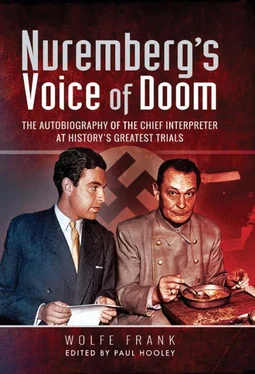Wolfe is scathing about the way the EEC was wasting money in general and about the way the translation and interpretation services were being run in particular. What follows is just one example he gives:
‘Each participant who has something to say will begin, “Thank you Mr Chairman for giving me the floor.” This then has to be simultaneously interpreted into all the other languages spoken, which at the time of writing, [c.1976] are: English, French, German, Dutch, Italian Danish and Greek. Therefore with this meaningless and superfluous bit of dogmatic drivel being repeated literally thousands of times every day, and based on the expenses needed to run the meeting (remuneration to delegates, interpreters, technicians, backroom and back up staff, room rent, electricity, etc.) it can safely be said that every year £1,367,000 (approximately) are used up by saying “thank you Mr Chairman etc” – I defy the critical reader to prove me wrong.’
Wolfe gives many other examples of EEC profligacy and accepts that he is, ‘biting the hand that fed him’ before he concludes his observations by explaining the terms under which he was employed: ‘My arrangement with the Commission was quite lucrative: they employed me for the maximum permitted twelve days per month and credited me with a first class rail ticket to Toulouse, which was now my professional domicile. I would work say Monday to Friday during two consecutive weeks (ten days) and then Monday/Tuesday in week three, or start on a Thursday plus Friday plus two five-day stints during the next two weeks. I did not, normally, go home for the in-between weekends.’
Working at the EEC brought Wolfe into contact with the final woman of importance in his life about whom he says she ‘entered my life under the somewhat constraining conditions of an interpreting booth.’ Her name was Ursula Weissenbock, an Austrian interpreter, and in September 1981 she became the fifth Mrs Frank.
Wolfe did not wish to include in his memoirs, which he clearly hoped would be published after his demise, details of his years with Ursula other than to observe that he thought they were generally happy ones during which, ‘they travelled a lot, ate the best food, drank the finest wines, heard the best music, saw the best plays – and drifted apart.’
Out of respect for Wolfe’s clear wishes I will add nothing about his relationship with Ursula other than to say that their marriage had ended sometime before January 1984 when Ursula remarried.
Wolfe had for a time prior to this period resumed his career as a financial adviser and had clearly had one last period of success. However, in addition to the break-up of his fifth marriage it seems that his resurrected business career had also floundered. Yet whilst this was undoubtedly another low point in his life he remained, as ever, optimistic – as the final paragraph of his epic 500-page manuscript, completed at the age of seventy in the autumn of 1983, clearly indicates: ‘Until a few months ago I was tycooning [ sic ] in the field of world-wide investments and I wrote over $800,000 dollars-worth of sales in three months – I hadn’t lost my touch. Maybe I still haven’t.’
In trying to sum up Wolfe Frank I would say he was a quite unique character of extreme contrasts. On the one hand he had spent a lifetime in the fast lane thoroughly enjoying himself – even during the most difficult of times. It cannot be denied that he was a lothario, a playboy, a risk taker, a serial adulterer, a heavy drinker, a participant in (sometimes an organizer of) orgies and he was an opportunist who liked nothing more than a challenge – even if that meant him risking his life. For most of his adult years he stayed on just the right side of whatever laws, rules and regulations were applicable, or he managed to avoid getting caught or severely punished if he ever broke them.
His other side showed him to be a man of immense courage, charm, good manners, honour and ability. He was highly intelligent, a gifted linguist and raconteur and one who, at times, moved in the highest circles of society and the theatre. His handling of the translations and interpretations at Nuremberg sets him apart from all other interpreters of his time, perhaps of all time. He was asked to undertake the toughest of assignments imaginable and he was perhaps the only man in the world who could have so satisfied all concerned. Wolfe not only rose to that challenge he surpassed all expectations and he was a major contributing factor in seeing justice prevail in less than one year when it could have taken four.
Following his finest hour, it seems Wolfe was not given the level of recognition he deserved – perhaps a too colourful private life and his less than total commitment to establishment rules and conventions denied him the honour his efforts so clearly merited. Although he rose again to a lesser extent during the ‘Subsequent Proceedings’ and then with his ‘Hangover after Hitler’ project, his life was never the same and he never capitalized on his achievements or used the celebrity status he could have adopted in the way so many lesser men do these days. Consequently, as he aged, public awareness of his outstanding contributions faded from memory.
Wolfe’s two great passions were enjoying life to the full, in whatever circumstances prevailed, and making love as often as he could to as many women as possible. As a strikingly handsome man with a personality to match he was irresistible to the fairer sex right up until his final days – yet was he ever really satisfied with his love life or happy with the ‘gift’ that had been bestowed upon him? Included in his memoirs, and written during the final days of his last marriage, is the following passage:
‘“Woman” to me is what makes the world go round. She is a being to be loved and adored, but I don’t like women. I have trusted women because I loved them, or was in love with them, and I knew during every minute of such a relationship that it is madness to trust any woman in every way – and the disappointments which ensued have proved me right.
‘It goes without saying, but should be said, that I have disappointed them every bit as much.
‘In retrospect, every relationship that went from love to disappointment, or from being in love to being indifferent, has been worth every moment it lasted.
‘There were four marriages and now there is a fifth. Each of these marriages was an outstanding factor during a particular phase of my life, a dominating factor, to be precise, and for that reason my life is “A Tale of Five Wives” whom I have loved and the memories of whom become more golden as time goes by.
‘It is doubtful that such feelings are being reciprocated. It has always been my decision to write things off, or not to resurrect something that looked hopeless.
‘Only, the ladies looked at such development with disfavour, all of them.’
Early in Wolfe’s memoirs he tells us how hurt he and his mother were by his father’s infidelities, yet he behaved in the same way. He was unfaithful to all his five wives as well as countless lovers, mistresses and lesser and casual conquests, many of who seemed to view him as a being a loveable rascal so often deserving of another chance.
In the early 1980s, Wolfe’s fifth marriage irrevocably broke down and a project in which he had invested was a financial disaster. Bereft of savings, Wolfe moved, quite by chance it seems, into private rented accommodation – The Malt House in the delightful village of Mere, which is situated on the Wiltshire/Dorset border (see Plate 23). There he became rather reclusive and, it seems, lived a somewhat lonely life. He was befriended by Mike Dilliway, the proprietor of a vehicle and bodywork repair business, which was a facility Wolfe needed to visit often because of the number of minor motoring accidents in which he was involved. To earn a living Wolfe had resumed his interpreting work at the EEC, but with failing health – he was suffering from Parkinson’s Disease and Glaucoma – and, not wanting to see a less than reliable car on the road being driven by a less than reliable driver, Mike persuaded Wolfe to allow him to drive him to and collect him from Heathrow Airport for his EEC trips.
Читать дальше












